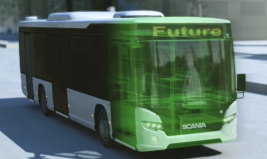Wireless Bus Stop Charging
Electric hybrid buses are commercially available and fully electric buses are being demonstrated in various projects around the world, including the EU. What is needed for full-scale implementation of electrified bus transport?
The electrification of bus transport is the subject of many research and demonstration projects around the world. Sweden has been one of the leaders in the development of electric bus transport. Recently, the fully electric bus line 73 was launched in Stockholm. Electric buses can be charged either conductively or inductively. Inductive charging is done through magnetic AC fields from coils that are buried underground. The benefits of this technology include minimal visibility and low influence of weather conditions (e.g. snow, rain) to the charging technology.

The project “Wireless Bus Stop Charging” aims at testing and evaluating the potential of wireless charging for buses in city traffic. Ultimately, electric busses shall contribute to reduce emissions, improve energy efficiency and reduce fossil-fuel dependence. Scania (bus manufacturer) is leading the project, which includes also SL (responsible for transport in Stockholm), Vattenfall (electricity provider), Municipality of Södertälje (where the charging station will be build) and KTH. ECS has recently joined the team of the Integrated Transport Research Lab (ITRL) at KTH to perform analysis related to the perception of travelers and service providers, and evaluate opportunities for upscaling the technology. The project is funded by the Swedish Energy Agency.
In this project, we verify the benefits of inductive-charging systems in comparison to other options for electric bus charging, as well as alternative engine technologies (i.e. biodiesel, biogas). It is also important to evaluate these benefits in real-life conditions and at full-scale. The real-time data collected from the demo operation will be used for evaluating benefits from energy efficiency improvement and emission reduction. We aim at exploring different ways of taking advantage of wireless charging but also ways for further development of the infrastructure needed to disseminate electric busses.
An institutional analysis will be carried out through a comparative study of electric bus deployment in Sweden and around the world. We look carefully not only at what technologies are being used, but also which actors are involved in the implementation processes, and how the infrastructure and investments needs are being covered. This will help us identify barriers and explore options for the expansion of the electric bus transport.

Researchers at ECS
Project duration
Dec 2014 to Dec 2017
More information about wireless bus charging
Wirelessly charged city bus tested for the first time in Sweden
